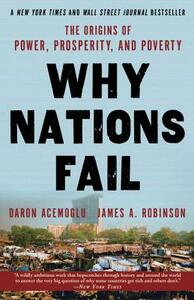Take a photo of a barcode or cover
695 reviews for:
Why Nations Fail: The Origins of Power, Prosperity, and Poverty
Daron Acemoğlu, James A. Robinson
695 reviews for:
Why Nations Fail: The Origins of Power, Prosperity, and Poverty
Daron Acemoğlu, James A. Robinson
challenging
informative
reflective
slow-paced
This was drier and more drawn out than was needed to make the point. If this were 1/2 the length, it would be a much better read, but I'm more of a social behavior girly than a history girly, so it wasn't engaging for me the way it may be for someone else. Some parts were interesting, nonetheless, and you certainly had plenty of opportunity to mull over the theory the book presents.
At the end of the day, I wish I had looked for and read an abridged version instead.
At the end of the day, I wish I had looked for and read an abridged version instead.
As of the first 142 pages, this really could have been a 20 page paper.
informative
medium-paced
Without a doubt, the single best book I've ever read to provide an overarching theory of the sources of global wealth and poverty.
It does live up to its name - It did allow me to make sense of why some nations fail and why some nations don't. I agree with its theory, and appreciate that it was thorough - it narrated different events in world history to prove its point. It was helpful for me, who doesn't really have strong foundations on world history knowledge.
My concern with this book was that it was difficult to read, especially as someone who is reading it out of curiosity, not because it was required of me from a professor. I wish it wasn't the case because this book is worth reading. Another concern is that I wish that the authors would update this book. Although I believe the theory presented still applies to today, I want to hear from the authors how they think of the nations now.
My concern with this book was that it was difficult to read, especially as someone who is reading it out of curiosity, not because it was required of me from a professor. I wish it wasn't the case because this book is worth reading. Another concern is that I wish that the authors would update this book. Although I believe the theory presented still applies to today, I want to hear from the authors how they think of the nations now.
A review of “Why Nations Fail” coming up just as soon as I finish drinking my coffee in the most democratic politically nation “at the time”.
Part shotgun history lesson, part neo-liberalism (possibly veiled White nationalism) this book reads much longer than it needs to be.
The conceit is that neither geography, nor culture, nor ignorance contributes to the “success” of a nation, but the inclusivity of its institutions.
It seems to me, the authors are keen on offering up a thesis while supplying numerous examples of “supporting” evidence but washing said evidence of any nuance or counterpoints.
The book begins in discussing how two sides or a region in Arizona (one being in Mexico) are quite different in terms of “prosperity”. The book offers up the history of the United States as compared with Mexico.
See English Colonialism vs Spanish Colonialism.
Their explanation details how the extractive institutions that were “successful” in Latin America were not successful in the English colonies because of the opportunities afforded to new settlers in the “new world”. I felt as though they were holding back a piece of this puzzle for a grander point, but alas they felt it prudent to completely ignore that the growth of the United States was still possible due to the exploitation of the African slave.
In addition, they forget to mention the bad faith trades/exploitation of the Native American peoples.
Another point, which could be noted is being made almost ten years after the release of this book in a post(for now) Trumpian world; the book possesses some interesting passages to consider:
“The United States is also far richer today than either Mexico or Peru because
the way its institutions, both economic and political, shape the incentives of businesses, individuals, and politicians.... it is the political institutions of a nation
that determine the ability of citizens to control politicians and influence how they behave. This in turn determines whether politicians are agents of the citizens, albeit imperfect, or are able to abuse the
power entrusted to them, or that they have usurped, to amass their
own fortunes and to pursue their own agendas, ones detrimental to
those of the citizens"
"As institutions influence behavior and incentives in real life, they
forge the success or failure of nations. Individual talent matters at
every level of society, but even that needs an institutional framework
to transform it into a positive force. Bill Gates, like other legendary
figures in the information technology industry (such as Paul Allen,
Steve Ballmer, Steve Jobs, Larry Page, Sergey Brin, and Jeff Bezos),
had immense talent and ambition. But he ultimately responded to
incentives....The economic institutions in the United States enabled
these men to start companies with ease, without facing insurmountable barriers...."
"This book will show that while economic institutions are critical
for determining whether a country is poor or prosperous, it is politics
and political institutions that determine what economic institutions a
country has. Ultimately the good economic institutions of the United
States resulted from the political institutions that gradually emerged
after 1619. Our theory for world inequality shows how political and
economic institutions interact in causing poverty or prosperity..."
All that to say, given what has transpired in the years after this book was written, I think there is an interesting follow-up discussion to be had in regards to how the institutions of the "successful" countries are fairing in 2022.
I think this is a book that people should read, but maybe don't look at it as any time of answer to a question, but a chance to round out your knowledge of geo-political history and a log in the fiery discussion of the global economical state.
Part shotgun history lesson, part neo-liberalism (possibly veiled White nationalism) this book reads much longer than it needs to be.
The conceit is that neither geography, nor culture, nor ignorance contributes to the “success” of a nation, but the inclusivity of its institutions.
It seems to me, the authors are keen on offering up a thesis while supplying numerous examples of “supporting” evidence but washing said evidence of any nuance or counterpoints.
The book begins in discussing how two sides or a region in Arizona (one being in Mexico) are quite different in terms of “prosperity”. The book offers up the history of the United States as compared with Mexico.
See English Colonialism vs Spanish Colonialism.
Their explanation details how the extractive institutions that were “successful” in Latin America were not successful in the English colonies because of the opportunities afforded to new settlers in the “new world”. I felt as though they were holding back a piece of this puzzle for a grander point, but alas they felt it prudent to completely ignore that the growth of the United States was still possible due to the exploitation of the African slave.
In addition, they forget to mention the bad faith trades/exploitation of the Native American peoples.
Another point, which could be noted is being made almost ten years after the release of this book in a post(for now) Trumpian world; the book possesses some interesting passages to consider:
“The United States is also far richer today than either Mexico or Peru because
the way its institutions, both economic and political, shape the incentives of businesses, individuals, and politicians.... it is the political institutions of a nation
that determine the ability of citizens to control politicians and influence how they behave. This in turn determines whether politicians are agents of the citizens, albeit imperfect, or are able to abuse the
power entrusted to them, or that they have usurped, to amass their
own fortunes and to pursue their own agendas, ones detrimental to
those of the citizens"
"As institutions influence behavior and incentives in real life, they
forge the success or failure of nations. Individual talent matters at
every level of society, but even that needs an institutional framework
to transform it into a positive force. Bill Gates, like other legendary
figures in the information technology industry (such as Paul Allen,
Steve Ballmer, Steve Jobs, Larry Page, Sergey Brin, and Jeff Bezos),
had immense talent and ambition. But he ultimately responded to
incentives....The economic institutions in the United States enabled
these men to start companies with ease, without facing insurmountable barriers...."
"This book will show that while economic institutions are critical
for determining whether a country is poor or prosperous, it is politics
and political institutions that determine what economic institutions a
country has. Ultimately the good economic institutions of the United
States resulted from the political institutions that gradually emerged
after 1619. Our theory for world inequality shows how political and
economic institutions interact in causing poverty or prosperity..."
All that to say, given what has transpired in the years after this book was written, I think there is an interesting follow-up discussion to be had in regards to how the institutions of the "successful" countries are fairing in 2022.
I think this is a book that people should read, but maybe don't look at it as any time of answer to a question, but a chance to round out your knowledge of geo-political history and a log in the fiery discussion of the global economical state.
slow-paced
challenging
medium-paced




